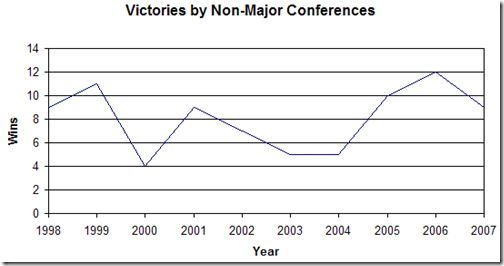Jason Kottke links to a post purporting to expose the “rent vs. buy” myths that contributed to the housing bubble. The claim seems to be that people who should have been renting bought instead, making the housing bubble worse:
Potential buyers bought into all sorts of rent vs. buy myths to justify buying houses that they could not afford during the boom. Now that the U.S. housing market is in shambles, people are starting to realize that renting may not be a dirty word after all.
It’s an interesting theory. Unfortunately, most of the five “myths” aren’t really myths at all. First some parameters for our discussion — to compare renting and buying, the appropriate comparison should be renting a single family home vs. buying a single family home or renting an apartment vs. buying a condo. It’s not really a fair comparison to examine a two bedroom apartment and a four bedroom house, and the options have entirely different cost-benefit analyses. Given that I have children, I’ll look at the single family home option, not the apartment/condo one. We’ll also assume this house is being rented from a private landlord, as is the case with the vast majority of single-family detached homes available for rent. These assumptions may skew the analysis, so YMMV.
On to the “myths”…
Myth #1: Renting is Like Throwing Your Money Away
Buyers throw their money away for the first five years they own a home, because they simply give money to the bank for the privilege of borrowing money. Renters, on the other hand, pay for one thing every month: shelter. They don’t pay interest to the bank, property taxes or maintenance fees. They pay rent.
There is a nugget of truth here. The amortization schedule for a 30 year mortgage provides that you pay mostly interest in the early years. For example, if you have a $300,000 mortgage at 6.0% interest, here’s how it breaks down:
- Year 1: 17% principal, 83% interest
- Year 2: 18.1% principal, 81.9% interest
- Year 3: 19.2% principal, 80.8% interest
- Year 4: 20.4% principal, 79.6% interest
- Year 5: 21.7% principal, 78.3% interest
- Cumulative years 1-5: 19.3% principal, 80.7% interest
Based solely on the principal payments and assuming no appreciation in housing prices and a 100% initial mortgage, you’d have equity of $20,836.86. That’s not a lot, but it’s not zero. The argument for home ownership is that you get something for your housing expenditure every month, not that you get wealthy. The return is low, however, and can’t the renter invest what he doesn’t spend on interest, maintenance costs or property taxes? The problem is that renters do pay for property taxes, maintenance fees and insurance. They just don’t pay them to the government, homeowners association or bank. Landlords aren’t charities, and the rent they charge is going to be equivalent to their mortgage payment, expected maintenance expenditure and some amount of margin. If you’re saving money, it’s because the landlord either (a) has paid off their mortgage or (b) bought the house when housing costs were lower and therefore has a lower mortgage payment. Given how quickly most landlords flip rental properties, the difference between renting and buying in this scenario isn’t that much.
Most renters do pay less in rent than they do when they buy, but a large part of the difference (at least around here) is that they buy a much nicer house than they were renting.
Myth #2: There are Tax Benefits to Owning
Contrary to popular belief, buyers do not get back the mortgage interest they paid throughout the year at tax time. Mortgage interest can only be deducted from taxable income. This essentially means that buyers pay a dollar just to save 30 cents.
Furthermore, deducting interest has no tax advantage unless a buyer pays so much in interest that the amount exceeds the standard deduction that everyone–including renters–is allowed to take.
When it comes to owning, the only guarantee is that buyers will be required to pay property taxes. Since renters are not required to pay any taxes on the property they rent, it seems downright foolish to factor the ‘tax benefits’ of owning into a buying decision.
If someone thinks they’re going to get back every penny they spend in interest, they’re an idiot. It’s a deduction, not a tax credit. And it, in and of itself, is not a reason to buy. But it does factor into the equation. Take the example above, for instance. Our hypothetical buyer pays $1,798.65 each month. In the first year, they pay $17,899.80 in interest. Assuming a marginal tax rate of 28%, they’ll reduce their tax (or increase their refund) by $5,011.94, which means that for the first year, they are effectively paying $1,380.99 each month in principal and interest. For most buyers, the tax deduction goes a long way in erasing any cost benefit to renting. Plus, the landlord isn’t eating his interest expense; he’s passing it through to you and keeping the tax benefit for himself.
The standard deduction argument is an almost completely irrelevant one. The 2008 standard deduction for couples filing jointly is $10,900. If you itemize, you’ll deduct not just mortgage interest, but property taxes and state/local income taxes as well. The number of homeowners who can’t itemize is a number statistically indistinguishable from zero.
Myth #3: It Doesn’t Cost Any More to Buy Than It Does to Rent
People can usually rent a home by paying first month’s rent, last month’s rent and possibly a security deposit. All the money that is paid initially actually goes towards monthly payment obligations, with the exception of the security deposit, which is nearly always returned to the renter in the end.
When a person buys a home, the money that is paid upfront is more significant and may or may not be seen again. For example, a buyer must pay closing costs (typically five percent of the loan amount) and real estate agent commission (typically six percent of the loan amount) before being called a homeowner. This 11 percent ‘investment’ ensures that the home must appreciate by at least 11 percent before the buyer can hope to break even.
Initial costs aside, there are also other costs a buyer is responsible for that a renter is not, such as mortgage interest, property taxes, insurance and maintenance. These costs can add up and may even increase significantly over the years.
There’s actually a nugget of truth here. The upfront costs of renting are generally cheaper than the upfront costs of buying. Assume a $1,200 rental payment against our hypothetical $300,000 mortgage. The renter is probably out $2,400 up front. The buyer’s closing costs are going to depend on the loan, but will probably be around $4,000, assuming you’re not paying points (and if you are paying points, you get another tax deduction).
This is one of the places that “eFinanceDirectory” prints a blatant falsehood. The seller, not the buyer, pays the commission. Further, the renter may not be directly responsible for mortgage interest, property taxes, insurance and maintenance, they are indirectly responsible for them, as the landlord will expect to recover those costs through the rent payment.
Myth #4: Buyers Have Assets, Renters Do Not
At best, buyers have depreciating assets. Home prices are falling in nearly every area of the country. An estimated 50 percent of the buyers whose loans were originated after 2002 now owe more than their homes are worth.
Homeowners who have been paying on their homes for ten years or more are seeing their equity disappear. This means that the ‘investment’ they made through mortgage payments is gone–dried up virtually overnight through no fault of their own.
Renters may not co-own a home with a lender, but this doesn’t mean that they don’t have assets. Many renters have a large and prosperous portfolio, Star Wars collectibles (just an example) and other assets that can be sold IMMEDIATELY for cash. The reason they own these things is because they haven’t been paying a lender to ‘rent’ money so that they could pretend like they own an asset.
In the current housing market, especially on the coasts, housing prices have certainly fallen. There are borrowers who are upside down on their mortgage and will take a loss if they sell. This is certainly not true everywhere, and unlikely to be true over time. Here in Richmond, housing prices have continued to appreciate, albeit slowly. In markets that went crazy over the last decade, prices have collapsed, although many of the people now taking a hit were both buyers and sellers during that period. So the reality is that some buyers have equity and some don’t. On the other hand, no renter has an asset they can pledge as collateral (just try to get a small business loan based on those Star Wars collectibles).
Myth #5: Houses are a Good Investment
During the housing boom, everyone thought that housing was a great investment. Many people bought under the assumption that home prices go up, not down. The result of this madness is the biggest foreclosure crisis in the history of the United States.
The reality is that housing is not an investment. It’s shelter. That is all housing has ever been. Self-serving organizations like the National Association of Realtors like to tell people that buying a home is a good way to build long-term wealth, but this statement couldn’t be further from the truth.
Again, there is a nugget of truth here. If you have money to invest, you’re better off buying mutual funds than buying a house. But that’s not really a proper comparison. The issue isn’t homeownership vs. stock ownership; it’s homeownership vs. renting. The former has a small return. The latter has no return at all.
Essentially, these 5 myths boil down to this: renting is cheaper than buying, and if you invest what you save by renting, you’ll make up any benefit you get from buying. That’s not necessarily the case, given that landlords have mortgages, too. The money you save is mostly because renting a crappy house is cheaper than buying a nice one. You can save money by renting an apartment instead of buying a house, and many people are better of renting an apartment instead of buying a condo.
This comes off as a puff piece for home ownership, but it shouldn’t be. Renting is right for some and wrong for others. You certainly shouldn’t buy more house than you can afford based on some ephemeral tax advantage. But there are benefits to home ownership, and there are reasons to buy other than the evil influence of the Realtor/banker/mortgage broker cabal.






 (2) At this point, Gmail will open messages just fine, but to get to where you were with Beta 3, switch back to the new interface by clicking the link.
(2) At this point, Gmail will open messages just fine, but to get to where you were with Beta 3, switch back to the new interface by clicking the link.